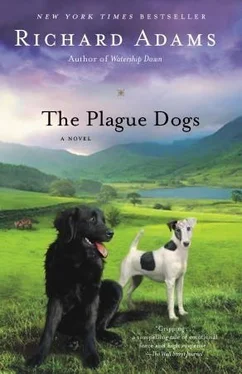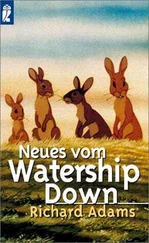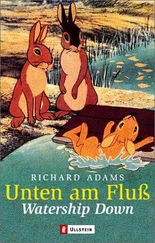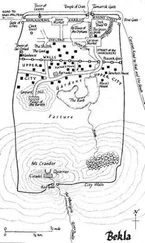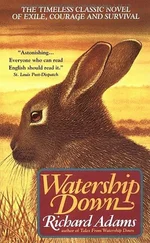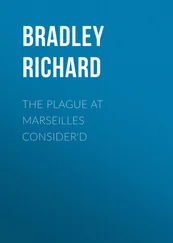“I may be able to help,” said Driver. “I’m a newspaperman. That’s why I’m after the soldiers. And the soldiers are after the so-called Plague Dogs, if you know about them. D’you mind telling us where you fit in?”
“My name’s Rose—Major Rose. I’m the warden of the Drigg nature reserve. That’s all this peninsula, as far as it goes down—about two miles of dunes. Well, what the hell do the soldiers think they’re doing, can you tell me? Fortunately it’s a slack season now, very few migrants about, but dammit all, it’s bad enough. My wife’s told me she heard a couple of shots fired. I ask you! Shots!”
Mr. Wood could not suppress a cry of anguish.
As quickly as possible, Digby Driver explained the position. Major Rose listened with evident sympathy and understanding.
“Well, we might just be in time to do something yet. For one thing, no one can legally use a firearm in the nature reserve, and I don’t care who the hell they are. Come on, let’s get down there in the car—or as far as we can. I’m afraid the track doesn’t go anything like as far down as Drigg Point, but it’ll take us a good bit of the way and after that I expect we’ll be able to manage something. Can I hop in beside you, Mr, Driver? Splendid, You all right, Mr. Wood? God, you’ve got some guts! Walked out of the hospital, did you, just like that? Good for you! Sure to be a blessing on that.”
They had not gone far down the peninsula when they observed two red berets stumbling their way towards them over the undulant dunes. They could be seen pausing, looking out to sea through binoculars and pointing. Major Rose got out and went briskly to meet them, while Digby Driver helped Mr. Wood out of the car and gave him his shoulder to do the best he could to follow. It took them several minutes to reach the soldiers. When they finally did so, Major Rose seemed to have calmed down a little.
“Mr. Driver,” he said, “this is Major Awdry, who tells me he’s in charge of this dogs’ exercise, and oddly enough we’ve both been in the same regiment—before he transferred and started jumping out of aeroplanes, that is. He tells me they haven’t shot your dog, Mr. Wood, but I’m afraid it’s a bad prospect for the poor beasts, all the same.”
“What’s happened?” cried Mr. Wood. “Where are they?”
“They’re out there,” said John Awdry grimly, pointing and handing over his binoculars. “I’m afraid you can hardly see them now. The tide’s taken them out pretty far and there’s a north-setting current that’s sweeping them up the coast as well.”
“They might come ashore on Barn Scar,” said Major Rose. “That’s a sandy shoal, you know, that stretches out quite a long way about a mile and a quarter north of here. Tide’s on the turn, too. If only they can stay afloat,” he added. “Your chaps won’t be shooting any more, will they? Where are they, by the way?”
“I left them down by the point,” replied Awdry, “while Mr. Gibbs here and I came up the shore to try and keep the dogs in sight. No one’s authorized to fire except officers, and we won’t, of course, so don’t worry about that.”
Mr. Wood, having been helped to sit down, remained staring out to sea through the binoculars without a word. There was, however, nothing now to be seen between the tossing waves and the grey, November sky.
“Can’t—any more—Rowf.”
“Bite on to me, Snitter. Bite!”
“Cold.”
“The island, Snitter—the Isle of Dog! We must get there!”
“Cold. Tired.”
No feeling in the legs. Cold. Cold. Longing to rest, longing to stop, losing two gasps in every three for a lungful of air. The stinging, muzzle-slapping water, rocking up and down. This isn’t a dream. It’s real, real. We’re going to die.
“I’m sorry—Snitter, about—about the tod. All my fault.”
“That’s it! Remember—tod—tell you—reet mazer—”
“What?”
“Reet mazer—yows—”
Cold. Sinking. Bitter, choking dark.
COLLOQUY
THE READER: But are the Plague Dogs, then, to drown
And nevermore come safe to land?
Without a fight, to be sucked down
Five fathom deep in tide-washed sand?
Brave Rowf, but give him where to stand—
He’d grapple with Leviathan!
What sort of end is this you’ve planned
For lost dogs and their vanished man?
THE AUTHOR: It’s a bad world for—well, you know.
But after all, another slave
It’s easy come and easy go.
We’ve used them now, like Boycott. They’ve
Fulfilled their part. The story gave
Amusement. Now, as best I can,
I’ll round it off, but cannot save
The lost dogs for the vanished man.
THE READER: Yet ours is not that monstrous world
Where Boycott ruled their destinies!
Let not poor Snitter’s bones be hurled
Beyond the stormy Hebrides!
Look homeward now! Good author, please
Dredge those dark waters Stygian
And then, on some miraculous breeze,
Bring lost dogs home to vanished man!
THE AUTHOR: Reader, one spell there is may serve,
One fantasy I had forgot,
One saviour that all beasts deserve—
The wise and generous Peter Scott.
We’ll bring him here—by boat or yacht!
He only might—he only can
Convert the Plague Dogs’ desperate lot
And reconcile bird, beast and man.
SCOTT, Sir Peter , Companion of the British Empire: Distinguished Service Cross.
Chairman of the World Wildlife Fund. Director of the Wildfowl Trust. Wildlife Painter. Ornithologist, naturalist and international wildlife preservationist.
Born 1909, son of Captain Robert Falcon Scott [of the Antarctic]. Exhibited paintings at the Royal Academy, London, since 1933. Specialist in painting birds and wildlife. Many lectures and nature programmes on British television since World War 2.
Winner of the international 14-foot Dinghy Championship, 1937, 1938, 1946. Bronze medal, single-handed sailing, Olympic Games, 1936.
Royal Navy, Second World War. Awarded M.B.E., D.S.C. and bar. Three times mentioned in despatches while serving in destroyers in the Battle of the Atlantic.
President of the Society of Wildlife Artists.
President of the International Yacht-Racing Union, 1955–69.
President of the Inland Waterways Association.
President of the Camping Club of Great Britain.
Chairman of the Survival Service Commission.
Chairman of the International Union for the Conservation of Nature and Natural Resources.
Chairman of the Fauna Preservation Society.
Chairman of the Olympic Games at Melbourne, 1956; at Rome, 1960; and in Japan, 1964.
Member of the Council of the Winston Churchill Memorial Trust.
Explored the unmapped Perry River area of the Canadian Arctic, 1949. Leader of expeditions to Australasia, the Galápagos Islands, the Seychelles Islands and the Antarctic.
Gliding: International Gold Badge, 1958. International Diamond Badge, 1963. British Gliding Champion, 1963. Chairman of the British Gliding Association, 1968–70.
Royal Geographical Society Medal, 1967.
Albert Medal, Royal Society of Arts, 1970.
Bernard Tucker Medal, B.O.U. 1970.
Arthur Allen Medal of Cornell University, 1971.
Icelandic Order of the Falcon, 1969.
Publications include: Morning Flight, Wild Chorus, The Battle of the Narrow Seas, Key to the Wildfowl of the World, Wild Geese and Eskimos, A Thousand Geese, Wildfowl of the British Isles, Animals in Africa, The Swans and The Fishwatcher’s Guide to West Atlantic Coral Reefs .
Has illustrated (inter alia): Adventures Among Birds and The Handbook of British Birds .
Читать дальше
